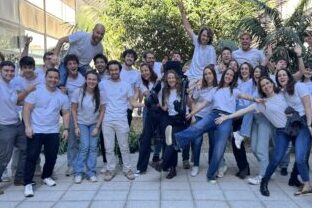14th April 2020

Management systems and data integration, remote health monitoring, mental & social healthcare, systems to ensure swift adaptability and pivoting of supply chains, but above all medical devices that improve lung function. Those are currently top wanted solutions to fight back against COVID-19 pandemic, explains Daniela Dias-Santos, a Physician Scientist trained in surgical oncology and translational research at Harvard Medical School. For almost 2 years she has been working for EIT Health InnoStars as an Innovation Project Analyst. Now as Regional Representative of the EIT Health COVID-19 initiative, she is looking for “matches” between asks and offers on behalf of EIT Health InnoStars. Find out more here.
EIT Health has just launched a matchmaking platform to fight COVID-19, where the community of healthcare professionals, scientists, companies, universities, hospitals and all innovators are called to collaborate across borders in order to find solutions to tackle the pandemic crisis. At the time of writing this article, there were over 190 asks and offers, first matches, and 70 best practices already shared.
“COVID-19 pandemic is a global issue that involves most layers of society as we know it. It is not just a healthcare problem. Never before in the 21st century has it been necessary to have global solutions on the table along with cross-border cooperation this urgently.”
1) In search of a “vaccine skeleton”
The whole world is waiting for the solution to fight coronavirus (COVID-19). The most dreamed-of one is to finally find a vaccine which will protect us from this kind of viruses. We need “vaccine skeletons”, which are basic common structures that could be adapted in accordance with the pathogen. For instance, a great deal of progress was done towards a vaccine against SARS and MERS (all caused by different types of coronaviruses), but the research was halted for the lack of funding. This is a very difficult and complex process and technologies such as Artificial Intelligence could help accelerate some parts of the process. Several partners in the EIT Health network are currently working on this topic.
“Flexibility and adaptability play a major role in all newly created solutions, but in order for you to adapt them you need to have at least basic systems and processes already in place or ready-to-go.”
2) Patients’ data under the microscope
There is a lot to learn from patients’ data and how they respond to coronavirus. Therefore, having data integration systems in place in the EU may become a gamechanger in future outbreaks. They will allow us to access information, learn lessons from other countries and implement measures faster. Useful decision support systems can only be built upon solid and trustworthy data.
3) “Lean” systems and adaptability of supply chains for medical equipment
Ventilators, personal protective equipment, devices that improve lung function, physical decontamination agents such as UV lights, among others, are currently in high demand. Re-designing the entire supply chain may be a necessity to survive in times of crisis such as this one. The production and delivery system must be optimized to fit the needs of the market that has now evolved. Digitizing the whole supply chain along with flexible “business pivoting” may be necessary to smooth the process of manufacturing and distribution. Two examples of useful tools are the use of tracking sensors and the 3D-printing technology potential used in medicine to speed up manufacturing of what may turn out to be crucial equipment in the front-line.
4) Map spread and fight back
Management systems allowing for quick calculations and mapping ventilators’ availability (both regional and national) as well as free beds (both at intensive care units and hospitals) are highly needed. Patient transfer management among hospitals has also become an essential tool to help local hospitals capitalize on their resources. Data monitoring and reporting, mapping of disease spread, and patient surveillance may be the key to contain the number of infected patients, learn more about the virus, and finally get ahead of the pandemic.
5) Mental & Social health empowers us
Mental health and self-care are also very important factors in the fight against coronavirus. In these very uncertain times, with isolation being essential on the battlefield, we all have to remember to take care not only of ourselves, but others too, especially the elderly and the most vulnerable in our society. We are now experiencing an increase in the use of web platforms as well as smartphone applications to manage loneliness, stress and anxiety. Other innovative solutions aim at societal improvement with food delivery, pharmacy errands and direct support for the elderly. Telehealth and psychological online support have now found their solid place in the healthcare system, convincing even the most sceptical in our society.
EIT Health and the EDIT-B consortium transform bipolar disorder diagnosis with groundbreaking blood test

Discover this life-changing project today.
Three EIT Health innovators nominated for EIT Awards

Meet our three EIT Award nominees.
Hospital Clínic study reinforces patient participation as key to digital health innovation

New work published in Journal of Medical Internet Research.